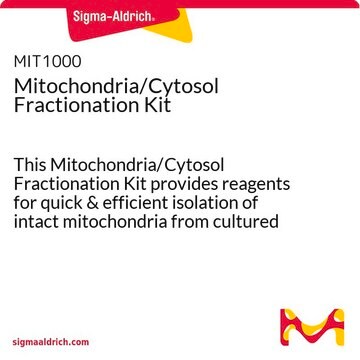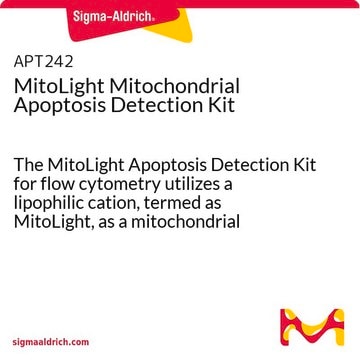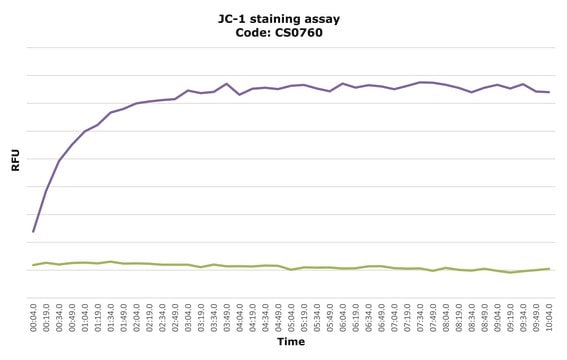Alle Fotos(2)
Wichtige Dokumente
MAK147
Mitochondrion Membrane Potential Kit
sufficient for 500 fluorometric tests (orange fluorescence, microplate readers)
Anmeldenzur Ansicht organisationsspezifischer und vertraglich vereinbarter Preise
Alle Fotos(2)
About This Item
UNSPSC-Code:
12161503
NACRES:
NA.25
Empfohlene Produkte
Verwendung
sufficient for 500 fluorometric tests (orange fluorescence, microplate readers)
Nachweisverfahren
fluorometric
Relevante Krankheit(en)
cancer
Lagertemp.
−20°C
Allgemeine Beschreibung
Mitochondria generate a potential across their membranes due to the activities of enzymes of the electron transport chain. During apoptosis, collapse of the mitochondrial membrane potential (MMP) coincides with the opening of the mitochondrial permeability transition pores, leading to the release of cytochrome c into the cytosol, which in turn triggers other downstream events in the apoptotic cascade.
Anwendung
Mitochondrion Membrane Potential Kit has been used to estimate the mitochondrion membrane potential in chinese hamster ovary (CHO) cells. It has been used in the permeabilization of the mitochondrial membrane test (MMP assay) and also used to detect the loss of mitochondrial membrane permeabilization.
Eignung
This kit is suitable for the detection of mitochondrial membrane potential (MMP) in mammalian cells and for screening apoptosis inhibitors and activators using microplate readers.
Prinzip
Mitochondrion Membrane Potential Kit is optimized for the detection of the loss of the MMP in cells. The cationic hydrophobic mitochondrial potential dye accumulates in normal mitochondria, most likely due to the mitochondrial potential, resulting in an increase in fluorescence (λex = 540/λem = 590 nm). In apoptotic cells, MMP collapse results in decreased fluorescence. This kit can be used for monitoring apoptosis and for screening apoptosis inhibitors and activators.
Lagerklassenschlüssel
10 - Combustible liquids
WGK
WGK 1
Flammpunkt (°F)
Not applicable
Flammpunkt (°C)
Not applicable
Analysenzertifikate (COA)
Suchen Sie nach Analysenzertifikate (COA), indem Sie die Lot-/Chargennummer des Produkts eingeben. Lot- und Chargennummern sind auf dem Produktetikett hinter den Wörtern ‘Lot’ oder ‘Batch’ (Lot oder Charge) zu finden.
Besitzen Sie dieses Produkt bereits?
In der Dokumentenbibliothek finden Sie die Dokumentation zu den Produkten, die Sie kürzlich erworben haben.
Kunden haben sich ebenfalls angesehen
Ngoc An Le et al.
Journal of medicinal chemistry, 64(10), 6792-6801 (2021-05-15)
Photodynamic therapy (PDT) is used to treat various cancerous diseases. Recently, we have demonstrated that platinated pyridyl-substituted porphyrins are potent agents for PDT with very high phototoxicity (IC50 down to 17 nM) and excellent phototoxic indices of higher than 5800
New metalo-therapeutics of NSAIDs against human breast cancer cells.
Banti C N, et al.
European Journal of Medicinal Chemistry, 143, 1687-1701 (2018)
A Zombie LIF Gene in Elephants Is Upregulated by TP53 to Induce Apoptosis in Response to DNA Damage.
Juan Manuel Vazquez et al.
Cell reports, 24(7), 1765-1776 (2018-08-16)
Large-bodied organisms have more cells that can potentially turn cancerous than small-bodied organisms, imposing an increased risk of developing cancer. This expectation predicts a positive correlation between body size and cancer risk; however, there is no correlation between body size
Cecilia Virginia Gheran et al.
International journal of molecular sciences, 23(6) (2022-03-26)
The aim of this study was to investigate the biocompatibility of contrast agents, such as gadolinium 1, 4, 7, 10 tetraazacyclo-dodecane tetraacetic acid (GdDOTA) and gadolinium dioctyl terephthalate (GdDOTP), encapsulated in a polymeric matrix containing chitosan and hyaluronic acid using
A zombie LIF gene in elephants is upregulated by TP53 to induce apoptosis in response to DNA damage
Vazquez J M, et al.
Cell Reports, 24(7), 1765-1776 (2018)
Unser Team von Wissenschaftlern verfügt über Erfahrung in allen Forschungsbereichen einschließlich Life Science, Materialwissenschaften, chemischer Synthese, Chromatographie, Analytik und vielen mehr..
Setzen Sie sich mit dem technischen Dienst in Verbindung.







